What’s the most important thing you want in your new house? Large and beautiful windows, without a doubt. Windows become the eyes of your home, allowing fresh air and natural light to come in.
They offer functionality and aesthetic appeal to any architectural design. However, when you plan a new house, get yourself familiarized with different types of windows. In this article, we will explore different types of windows, their role in architectural design, and sustainability for different buildings.
Let’s get into exploring building windows and discover how they can transform your living space. We will discuss the types of windows based on:
- Types of windows used in residential architecture based on what will look good for your house
- Types of windows based on what your home needs in terms of soundproofing, energy efficiency, etc
- Types of windows for different rooms, (living room, kitchen, etc)
Table of Contents
10 Different Types of Windows in Residential Architecture
For centuries, windows have been an essential component of architectural design, greatly influencing the appearance and functionality of structures.
Let’s read about some important types of windows trending in residential architecture:
1. Casement Windows

Casement windows typically open outward and are hinged at the side with a crank mechanism.
They are a mainstay of many architectural styles and are renowned for their classic elegance.
Casement windows are a common architectural element in Tudor and Colonial Revival buildings. These windows offer unhindered views of the outside world, such as your garden, and clouds on a rainy day, in addition to great ventilation.
2. Double-Hung Windows
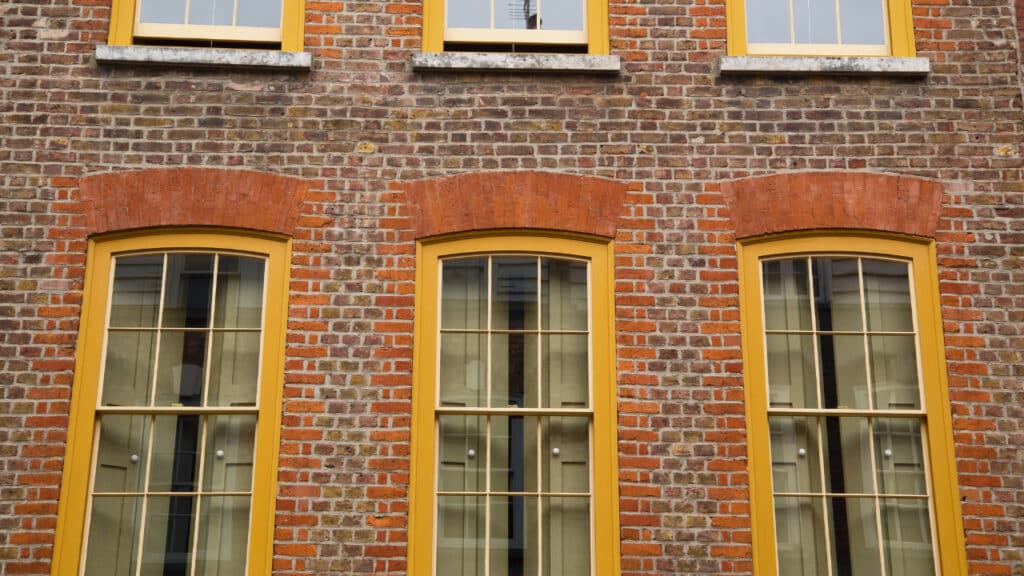
Double-hung windows feature two vertically movable sashes that slide within the window frame. They are frequently seen in Victorian and Georgian architectural designs.
Double-hung windows are renowned for their simplicity of operation and timeless appeal. Their dual-action opening mechanism allows for versatile regulation of air circulation and natural light.
3. Bay and Bow Windows
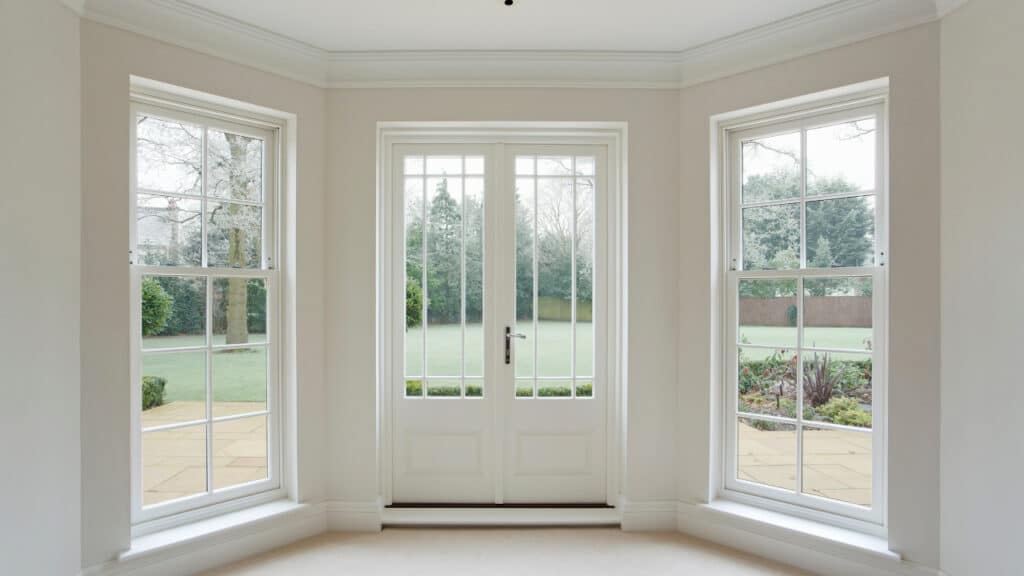
Bay and bow windows extend from the building, creating a charming nook or alcove. Victorian and Arts and Crafts architecture are two different styles of windows that come under this category.
Bow windows have four or more panels. These form a curved shape, whereas bay windows usually have three panels. These kinds of windows offer panoramic views and improve the visual appeal of a home’s exterior and interior.
4. Picture Windows
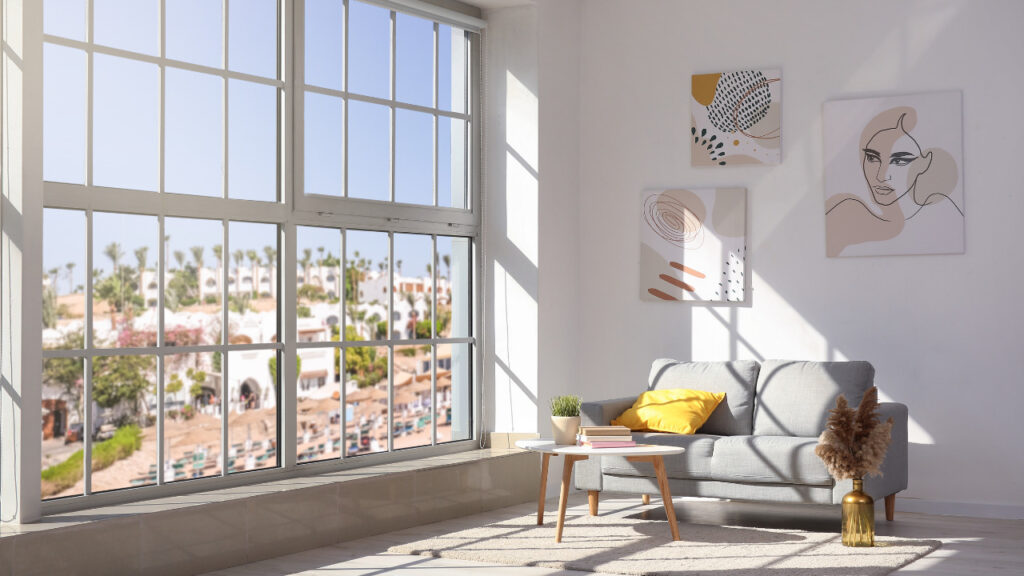
Picture windows are big, fixed, non-opening windows. These windows are in style because they optimize natural light and capture breathtaking views of the outside world. That’s why these windows are frequently used in modern and contemporary architectural designs.
Picture windows are perfect for homes with picturesque surroundings because they seamlessly connect the indoor and outdoor spaces.
5. Awning Windows

Like an awning, awning windows are hinged at the top and open outward from the bottom. They are widely utilized in contemporary and mid-century modern architecture.
These windows provide excellent ventilation, which also shields the interior from rain and debris. Their distinctive style gives any house a hint of refinement.
6. Colonial Style Windows
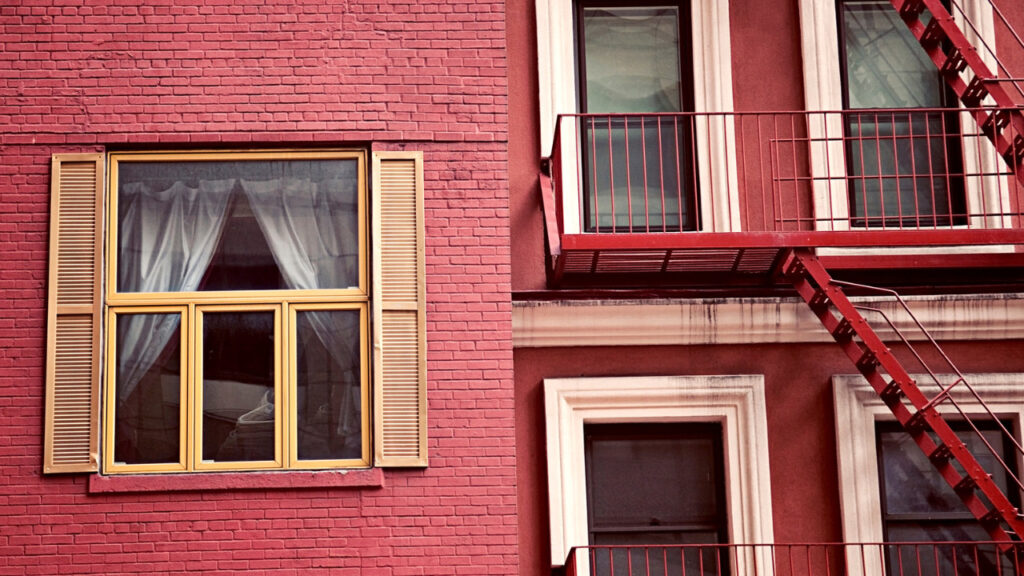
These types of windows are known for their symmetry and simplicity. You can see them being frequently linked with classic American homes with Colonial and Cape Cod styles of architecture.
Usually with divided lights and double-hung sashes, these windows add to the classic charm of the house.
7. Craftsman-Style Windows
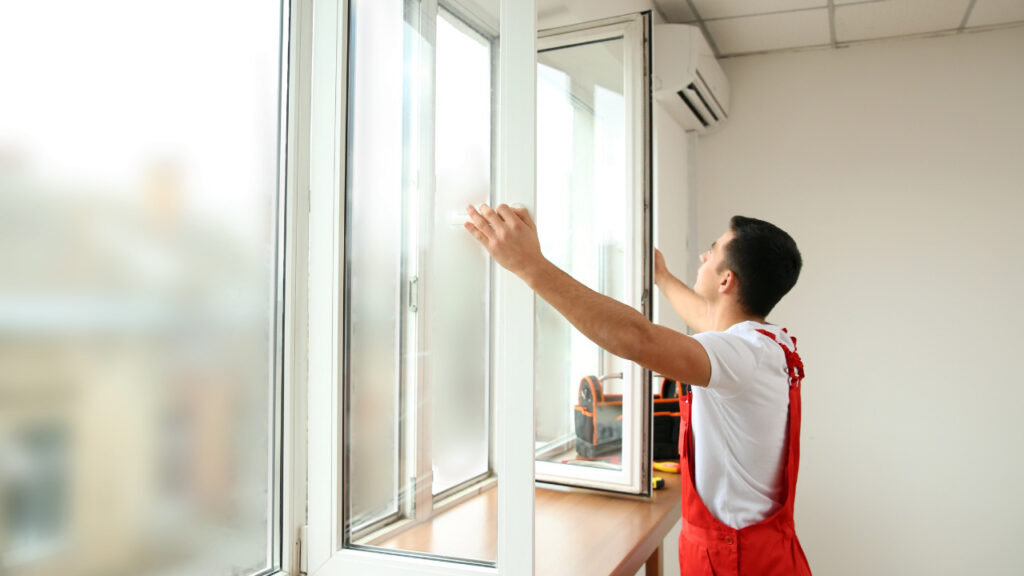
The Arts and Crafts movement, renowned for its skill and attention to detail, served as the inspiration for craftsman-style windows.
These windows frequently have several glass panes arranged in a grid design. Other window styles, like casement and bay windows, are also popular in craftsman-style homes because they provide personality and architectural interest.
8. Modern Style Windows
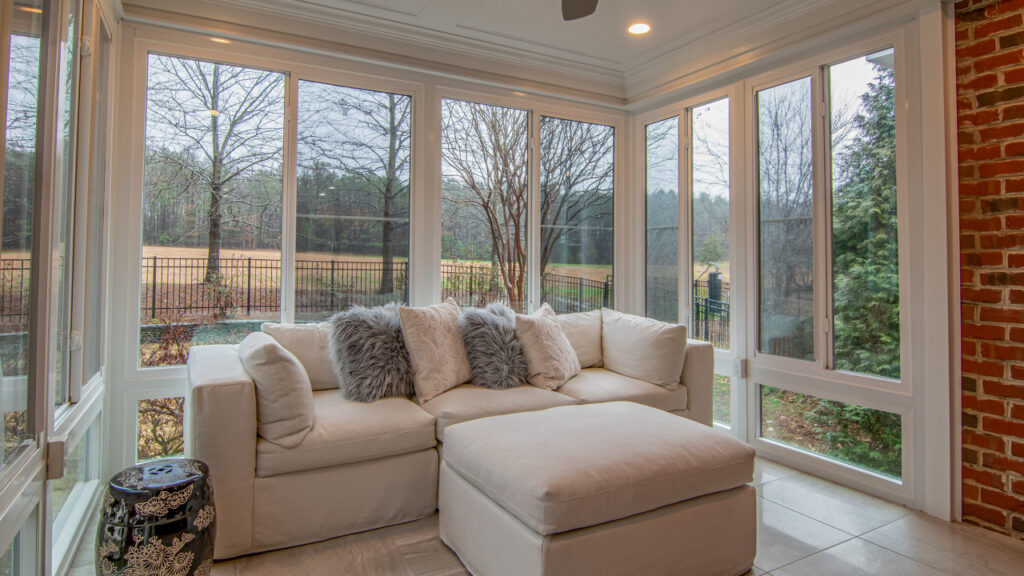
Clean lines, minimalism, and big windows that let in an abundance of natural light are the main features of modern architecture.
Modern homes frequently have floor-to-ceiling glass walls, sliding windows, and fixed picture windows. The lines between the inside and outside are blurred. These windows create an air of openness.
9. Mediterranean Style Windows
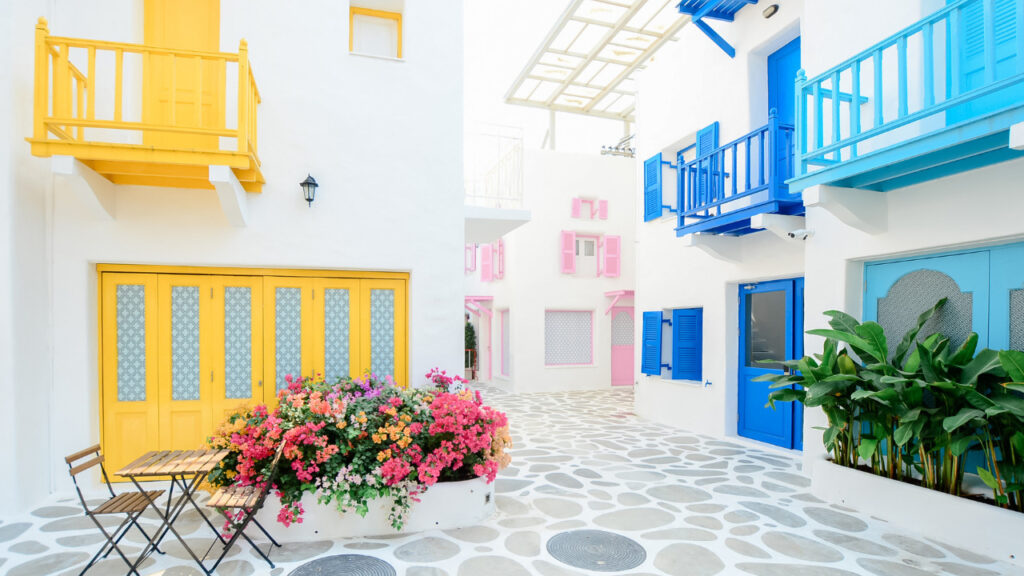
French doors with wrought-iron grilles and arched windows are common architectural elements of Mediterranean-style homes.
These windows highlight the Mediterranean-style terracotta roofs and stucco exteriors while lending an air of Old World charm to the architecture.
10. Victorian Style Windows
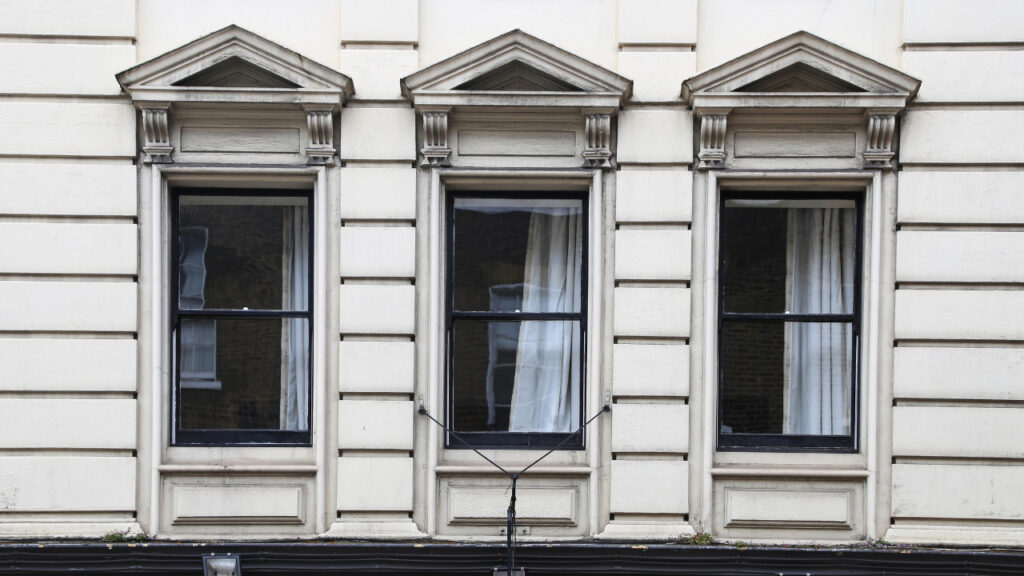
Homes built in the Victorian era are renowned for their elaborate and decorative architecture. Victorian homes frequently have ornate windows with decorative tracery, elaborate frames, and stained glass.
In Victorian architecture, bay and leaded glass windows are also typical.
5 Different Types of Windows Based on Your Home Needs
You should understand your home’s unique requirements, preferences, and architectural style when choosing windows for your house.
The benefits of different types of windows vary, and selecting the right ones can significantly improve your quality of life. You can choose one of these:
1. Energy-Efficient Windows
Double-glazed or low-emissivity (Low-E) windows are examples of energy-efficient windows that help with insulation and heat loss reduction.
For homes in colder climates or for those looking to reduce their energy costs, they are a great option.
2. Soundproof Windows
By reducing outside noise, soundproof windows help create a calmer and more serene living space.
These windows are perfect for houses next to busy streets or noisy urban areas.
3. Impact-resistant Windows
Windows designed to withstand strong winds, flying debris, and possible impacts during storms are known as impact-resistant windows.
They provide additional security against intruders and are essential for homes located in hurricane-prone areas.
4. Egress Windows
Building codes mandate egress windows in some spaces, especially basement bedrooms. With an emergency exit and the ability for residents to flee in the event of a fire or other emergency, these windows guarantee safety. So, you can consider adding these windows if you are big on safety.
5. Decorative Windows
Stained or leaded glass windows are the decorative windows that give your house a creative touch.
They are frequently used to create a distinctive and eye-catching atmosphere in entryways, transoms, and particular rooms.
Types of Windows for Different Rooms
Every room in your house has a distinct function, and the windows you choose can have a big impact on the atmosphere and functionality of each space. You should do your homework on installing windows based on each room.
Let’s go through some of the window styles that work well in different rooms of your house:
Living Room
The focal point of your house is the living room, where you host guests and spend important moments with your loved ones.
Large picture windows or bay windows with stunning views and lots of natural light are a great option for this area.
Your living room is a comfortable and relaxing place to unwind thanks to these windows’ welcoming and bright ambience.
Bedroom
Bedrooms are personal spaces, so how you arrange the windows can impact how comfortable and private you feel.
In bedrooms, casement, sliding, and double-hung windows are effective window options. They enable individualized control over airflow and offer good ventilation options.
In addition, if you live in a noisy neighborhood or need to regulate light levels for better sleep, you might want to think about installing blackout or soundproof windows.
Kitchen
Windows for kitchens need to be both aesthetically pleasing and practical. Kitchens benefit greatly from garden windows because they provide an area for herbs and indoor plants.
Above the kitchen sink, casement windows provide easy access for carrying food or dishes to an outdoor dining area and provide excellent ventilation.
You can consider installing awning windows to keep the kitchen dry from rain. These will also let the natural light in.
Bathroom
Smaller windows are frequently needed in bathrooms to preserve privacy while letting in natural light and airflow.
Bathroom windows work best with frosted or obscure glass because they offer privacy without compromising light.
Furthermore, installing skylights in bathrooms without windows is a fantastic way to add natural light.
Home Office
Windows with sufficient light and no distractions are ideal for a home office, where productivity and focus are the real deal. While preserving your privacy, high or clerestory windows can let in a lot of natural light.
Awning windows are a good option because they provide easy adjustment for optimal comfort and controlled ventilation.
Dining Room
Windows in dining rooms are helpful because they provide a cozy and comfortable ambiance. Because they create a cozy nook for your dining area and offer panoramic views, bay or bow windows are a great option.
Picture windows can also be effective, particularly if you want to highlight a stunning garden or landscape.
5 Factors to Consider When Choosing the Right Windows for Your Home
Choosing the right windows for your house is an important choice that impacts the look and feel of your rooms. Choose wisely and take into account the following aspects:
1. Architectural Style
Take into account your home’s architectural style first. Windows that complement the architectural style of your home will improve its overall appearance.
Various architectural styles have different preferences when it comes to windows.
2. Climate and Location
Consider your climate and geographic location.
While homes in warm climates might benefit from windows that allow for cross-ventilation, homes in cold climates might need energy-efficient windows to maximize insulation.
3. Personal Preferences
Think about your lifestyle and personal preferences. If you’re drawn to open areas and natural light, you might choose bigger windows.
Consider alternatives like impact-resistant windows or tinted glass if security or privacy are a concern.
4. Budget
A major factor in the window selection process is your budget.
Finding the right balance between quality and affordability is crucial because there is a variety of window options available, ranging from high-end to affordable.
5. Maintenance
Different degrees of maintenance may be necessary for different kinds of windows.
While vinyl or aluminum windows are relatively low-maintenance, certain windows, like those with wood frames, may need to be painted or sealed regularly.
Final Thoughts on Different Types of Windows
We have looked at different window types, their historical importance in building, and how well they fit into various spaces and architectural designs.
Knowing your options will help you choose windows for your house that will fulfill your functional needs and improve the overall aesthetic appeal and comfort of your living area.
Remember that windows and the architectural styles they adorn are just as diverse and fascinating a world as they are.





